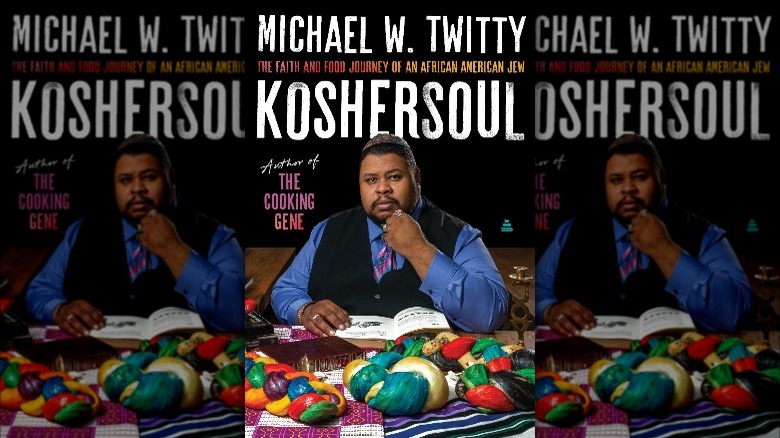What 'Koshersoul' Really Means, According To Michael Twitty - Exclusive
Michael Twitty's first book, "The Cooking Gene," took the world by storm with its insightful and poignant narrative of a man finding his way through generations of lost and often underrepresented history. Twitty used a combination of research and personal experiences to follow foods as they traveled seas and cultural lines, an effort that earned him a coveted James Beard Award. Now, he's back with his new book, "Koshersoul: the Faith and Food Journey of an African American Jew." Here, Twitty again attempts to document that which has rarely, if ever, been documented before, using food as a way to connect different facets of humanity.
In an exclusive interview with Mashed, he said, "How do you tell people you're everyday ordinary people? You tell them about your food. You tell them about how you break bread with your family. You tell them about the traditions that you're trying to create and pass on." Koshersoul might be a new term for some, but for Twitty, it is who he is and made up his original Twitter handle. But what exactly is koshersoul?
Kosher and Soul
When you break down the word "koshersoul," you get two terms, each with a distinct meaning. "Both terms are very quasi-ethnic," Michael Twitty said. "Kosher," he noted, can have a broader meaning than simply adhering to Jewish food law. "Kosher can double as Jewish, but it can also be a universal term, originating in the idea that 'kosher' in Hebrew means to be richly fit, according to the Torah." He explained that once you have a basis for that, the second term, "soul," fits perfectly. "Soul can be both. Yes, the essence of soul can be the essence of Black culture, Africanness, African Americanness, Negros, too. It could also be the soul food, and soul culture of other people as well."
He also explained that this would not be the first time "soul" has been used in a food context outside of its original meaning. "It's [now] in vogue to say Korean soul food or Greek soul food ... I get that. That's totally okay and applicable. At the same time, it's still a term that originated in the African American community to describe a certain feeling and essence that is otherwise like the umami of culture." So in that context, "What is it? You'll know it when you get there."
Ultimately, Twitty uses the term to describe the overlap in two communities, often thought of as being separate. "I wanted that to be the name for this broad swath of activity."
He's not the brand rep
Despite his popularization of the term, Michael Twitty hesitates to set a strict definition of koshersoul. "I've kept it open-ended, because I didn't want to be the brand rep. Sometimes, that happens." He hopes that by keeping it flexible, the term won't end up becoming overly commodified to the exclusion of the people it should serve.
"I've been making the joke recently that we learned our lesson from the preppy handbook, and from the grunge dictionary, and the hipster manual. These things are like pseudo, they're made up. They're not real. They're done to sell the idea of a culture to executives who will buy these books and start talking some weird grunge language."
"Koshersoul," both the term and the book, are used to describe any number of experiences of Jews of African descent. "I didn't want to write 'Koshersoul,' the exposé, right? I wanted to write 'Koshersoul,' an exploration of how different Jews of African descent make food, how food makes them."
"Koshersoul: The Faith and Food Journey of an African American Jew" is available now.


